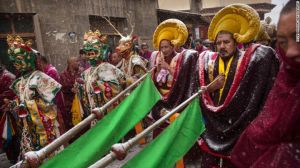Buddhist Books Further Purged from Temples and Libraries
The CCP continues its nationwide drive to clear out all unauthorized or foreign-published Buddhist materials, burning and otherwise destroying them.
by Wang Yong
The government of China’s northern province of Shanxi has been investigating Buddhist venues since May, to find and destroy publications related to Venerable Master Chin Kung. Nearly twenty temples have been harassed so far, including Guanyi Temple, Longhua Temple, Pudu Temple, and Longfeng Temple. The 92-year-old monk of Pure Land, a school of Mahayana Buddhism he has founded, is revered around the world for propagating intercultural and interfaith harmony. Books related to him and recordings of his speeches are very popular in China. Because of the Master’s fame, the CCP has labeled his teachings as “negative to China’s mainstream ideology” and banned his books as “illegal publications” and “fallacious arguments and evil teachings.”
“The state claims that Master Chin Kung cooperated with the West to oppose China and that his books ‘endanger state security’ and must be burned and destroyed,” an abbot of one of the raided temples told Bitter Winter.
Even though he doesn’t agree with the government’s assessment of Master Chin Kung, he had to destroy his publications. “There’s nothing wrong with these books, and they don’t contain revolutionary remarks. If I didn’t obey, I could be punished, and my temple would be closed,” the abbot.
A Buddhist master from Jiujiang city in the southeastern province of Jiangxi believes that the government has been destroying Master Chin Kung’s books mainly to safeguard its regime because he is widely renowned.
Other Buddhist publications that the state doesn’t approve or those that don’t have a government-issued publication number are also purged from Buddhist temples.
On May 9, the Buddhist Association of Zibo city in the eastern province of Shandong ordered the director of a local Buddhist temple to clear out all published materials without a publication number and those printed without authorization. “If even one ‘illegal book’ were left in the temple, I would be punished severely. The temple may also be shut down, and all monks driven out,” the director lamented.
On May 11, the Religious Affairs Bureau of Shandong’s Binzhou city demanded the director of a local Buddhist hall to hand them over all books without publication numbers. He explained to Bitter Winter that because a high number of Buddhist books in China don’t have publication numbers, quite a lot of them had to be tendered to the Bureau. According to the director, Buddhists’ situation in China is disastrous, like during the Cultural Revolution, when the CCP smashed religious statues and burned books.
In May, a Buddhist library in the northeastern province of Jilin was cleared of books published abroad and those by Chin Kung, as well as other Buddhist masters like Master Hueiliu, and Master Cheng Yen. Instead of them were displayed publications about China’s traditional culture, like “The Standards for Being a Good Pupil and Child” (Di Zi Gui in Chinese, the ancient manual based on the teachings of Chinese philosopher Confucius), and books by other Confucian philosophers like Mencius.
“Officials from the Culture Bureau came to the library twice, and those from the Religious Affairs Bureau once. They demanded us to destroy the books ourselves or sell them for scrap,” a Buddhist working at the library told Bitter Winter. “All books from foreign counties, including Hong Kong and Taiwan, were ordered to be removed from the library amid unrests in Hong Kong.”
The authorities also forced the library to remove its signboard “Buddhist Library” and replace it with a new one that had no association with Buddhism. Posters with Xi Jinping’s speeches have been displayed inside, and a photo of Zhou Enlai, the first Premier of the People’s Republic of China.
